#Les Mis Letters in Adaptation
Text
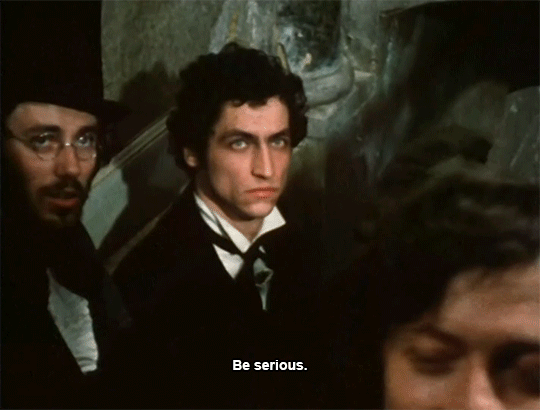


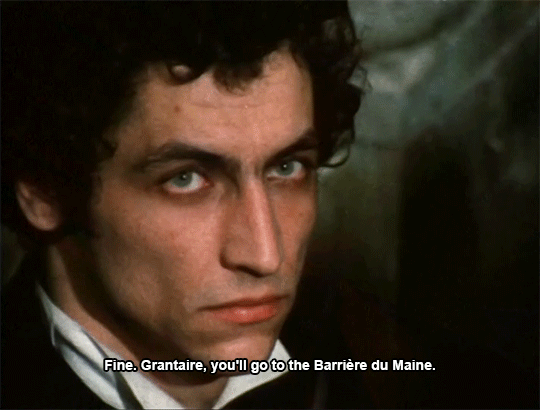
LES MIS LETTERS IN ADAPTATION - Enjolras and his Lieutenants, LM 4.1.6 (Les Miserables 1972)
“Be serious,” said Enjolras.
“I am wild,” replied Grantaire.
Enjolras meditated for a few moments, and made the gesture of a man who has taken a resolution.
“Grantaire,” he said gravely, “I consent to try you. You shall go to the Barrière du Maine.”
Grantaire lived in furnished lodgings very near the Café Musain. He went out, and five minutes later he returned. He had gone home to put on a Robespierre waistcoat.
“Red,” said he as he entered, and he looked intently at Enjolras. Then, with the palm of his energetic hand, he laid the two scarlet points of the waistcoat across his breast.
#Les Mis#Les Mis Letters#Les Miserables#Les Mis Letters in Adaptation#Les Mis 1972#Les Miserables 1972#Enjoltaire#Grantaire#Enjolras#lesmisedit#lesmiserablesedit#pureanonedits#LM 4.1.6#I kinda love this Grantaire!!!#lesmiserables1972edit
434 notes
·
View notes
Text
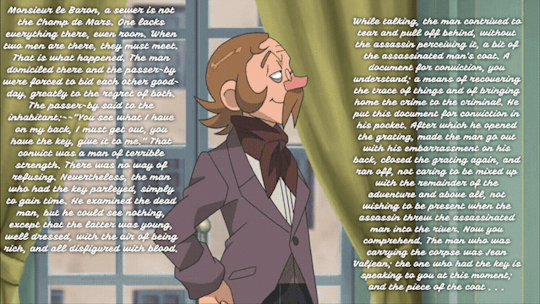







Thenardier's evidence of who dragged Marius out of the Barricade was Valjean, Volume 5, Book 9, Chapter 4.
Clips from <Il cuore di Cosette>.
#Les miserables#les mis#My Post#Thenardier#Marius#Though he gave the evidence but you don't have to give reward to him Marius!#(Well in this adaption. He didn't.)#The Brick#Il cuore di Cosette#Les Mis Letters
27 notes
·
View notes
Text
There’s so much to enjoy about 1.1.2 but here are some of my favourite things:
The immediate contrast we get between the lavish, detail-ridden, paragraphs-long description of the palace versus barely even a sentence about the hospital. I know we mock Hugo a lot for his digressions but the man DOES know how to be concise! He uses short sentences for effect all the time and this is one of my fave examples because it’s also just very funny in its bluntness.
The Bishop questioning the director of the hospital and saying some variation of ‘I know’ after every response. We saw it in the last chapter as well with how he addresses Napoleon but again, the sheer confidence!! The boldness!! Bishop M does not fuck around!!
“There is some mistake, I tell you; you have my house, and I have yours. Give me back my house” ICONIC ENERGY, ABSOLUTELY UNMATCHED
The Bishop filing absolutely everything under household expenses to the chagrin of Mme Magloire. On that note, the extent to which that house would fall apart without her and Mlle Baptistine because the Bishop is determined to give absolutely everything away (’and still I am cramped with it all!’)
’Expenses of carriage and circuit’ *goes on to list things that have nothing to do with carriage and circuit to the value of 3000 livres* this part always cracks me up there’s just something about the way Hugo writes which is almost tongue-in-cheek during these chapters, especially with the set up beforehand where the rich senator rants about how Bishop M is swindling money he doesn’t need for his own selfish gain. Once again, Les Mis is a comedy!!!!!!
“As there is always more wretchedness below than there is brotherhood above” what a raw line. And we’re only in the second chapter!
Also, whilst we’re here: this is the point!!!! I know we all joke about the ‘the following has no direct bearing on the story’ thing but these first few chapters do such a good job establishing the thesis of the novel. Bishop M is literally the most altruistic guy ever to the point where it borders on parody and there is still more ‘wretchedness’ than he can ever possibly solve as an individual, even just in the small town of Digne, even with donating the majority of his income to the poor and taking the principle of abnegation to the extreme. It feels like Hugo is anticipating criticism to the tune of ‘we don’t need structural change we just need more charity/inidividual change/philanthropy/etc!’ and immediately rejecting that as a solution before the novel even gets properly underway by showing how no amount of selflessness will ever overcome the power of systemic violence. (Also for more on this here is a really good post by @secretmellowblog about Bishop M but do be aware it has small spoilers for future chapters if you’re doing a first-time read and want to avoid those!)
In summary:

#les mis letters#les mis#bishop myriel#i remember reading the brick for the first time and i always just really liked this chapter#it's so rich with detail but in a way that provides so much extra context outside of the bishop himself#we're setting the scene we're delving into the social the political the economic!!!!#this is a book on an epic scale and hugo is not going to let us forget it!!!!#'give me back my house' is still my favourite bishop moment i need all future adaptations to include that bit thanks#1.1.2
195 notes
·
View notes
Text
I love Myriel so much..... but also it’s such a common trait to the characters in this book, where the most martyr-like you are, the more good you are, and if on one hand I agree -- thinking of the others is GOOD, giving lots of money when you have lots of money to help those who need it is GOOD, it also always bothers me a bit when your renouncement of things affect others.
Myriel’s generosity is wonderful, but it comes at the expense of more stress and work for Baptistine and Madame Magloire. We’re supposed to find it amusing, that Madame Magloire thought the money was for them, but she’s got a POINT here. Madame Magloire probably knows there is value in, y’know, having good food and good stuff in your home; that she has to think and be austere about it all most of the time, that Baptistine has to be clever about budget, because /Myriel/ decided everything he has goes outside the house, it’s just. It feels a bit unfair. Especially when obviously it’s not the sort of time or household where Baptistine and Magloire can be “that’s lovely for you but we’ll go other there then okay? love u.”
ANYWAY THIS IS ONLY THE SECOND CHAPTER AND I ALREADY WANT THE STORY OF LES MIS ONLY TOLD BY THE WOMEN’S POINT OF VIEW AGAIN
54 notes
·
View notes
Text


this is spanish 1971 bishop he loves you and will give you delicious soup when you're sad < 3
#les mis letters#les mis#this has nothing to do with the book I just keep thinking of him since I started rereading the book#bc he's my favorite bishop of any adaptation#he's VERY SOFT very nice very grandpa#100 % recommend#les mis 1971#les mis 1971 spanish miniseires#I wish I had a better screenshot but just TRUST ME#*this has nothing to do with the episode we're in
26 notes
·
View notes
Note
and what's up with roxane? OOH WAIT IS THIS THE ROXANE I THINK IT IS?
IT PERHAPS IS! well, it's an au, so there is A roxane here but it's not THE roxane. basically one day during a boring lecture my brain was like "hey, you know how you ship TWO tragic ot3s from classic french literature?" and then i kinda ran with that.
basically the premise of this fic [working title "roxane, you don't have to turn on the red light"] is smushing together cosette/éponine/marius with the movie roxanne (1987) which is an 80's au of cyrano de bergerac. éponine is cyrano, fire chief of the town (her "nose", i think, is being a masculine woman, although indecision about that / unwillingness to present that as a source of such deep insecurity has been the reason why this au has stalled so hard); marius is roxanne, grad student of philosophy or something, because i think it's funny; and cosette is christian, the town's newest firefighter.
I know that last month, on the twelfth, one day you put your hair up. / I am so used to mistaking your hair for daylight that, like the afterimage left when you stare at the sun-- when I look away from you, my eyes see nothing but gold.
“What are you writing?”
Éponine startles violently, hastily flipping over the page in front of her. Cosette is standing across her desk, grinning, looking ready to grab and read the letter Éponine has been trying to stop herself from writing for three days now.
“Nothing for you, for once,” she says, the lie falling out easily. She drops her pen into a cup on the table and draws the page into her pocket, trying and failing to make the motion look casual. “What did Marius think of the latest letter?”
“He loved it, of course,” Cosette says, taking pity on her and dropping the topic of the paper. She sits down across from Éponine’s desk. “He loves everything you write for him.”
Éponine knows that tone -- doesn’t know how to respond to it without hurting herself more. Then again, that isn’t the point, is it. “He loves you.”
“I do hope so,” says Cosette, smiling at her.
Éponine’s heart makes an odd motion, like someone is wringing it out.
#sb and l rambles#sb and l writes#les mis#cosette x éponine x marius#aethersea#i was SO CLOSE to putting part of the opening scene here but it needs a lot more polishing#this scene here is the first one i wrote and it's still the cleanest#for the record the letters eponine writes to marius (as cosette) will be genderswapped versions of the ones from the movie#but the letters she writes to cosette (like this one we see here) are adapted from the letters in the original play#because cosette is still kind of her roxanne in some ways#éponine de bergerac
8 notes
·
View notes
Text
Please mind the #wineposting tag. Regardless: are you asking, "Should I watch this adaptation of Les Misérables?" I'll give you advice, though I suspect if you are reading this blog post you have watched all of these anyway (and quite possibly a few more, besides!).
'25 (Fescourt): Probably! If you are a Brick fan none of the adaptation choices will startle you, but having visuals to go with key scenes is a treat. This is a loyal piece. Toulout as Javert, Gabrio as Valjean, Milovanoff as Fantine, and Nivette as Éponine all give excellent performances. Be prepared for a lukewarm Cosette. You might struggle with silent film conventions, length, and French intertitles.
'34 (Bernard): Probably! This is a fairly loyal adaptation of the Brick that makes internally consistent choices where it deviates from its source (sometimes it has goofy continuity errors—politely ignore). Baur as Valjean and Gaël as Cosette give fabulous performances. Moments of silliness do not detract from the quality. Another long haul.
'35 (Boleslawski): Probably not. As an adaptation of Les Misérables this film is bad. That being said, Charles Laughton is a lauded actor, and you can't say he didn't put his whole laughussy into his performance. Because it is accessible and prominent, a lot of LM fans will have seen this film, and you might benefit from shared context if you're in fandom. Speaking personally, I'm glad I saw it, but I'm not sure you will be.
'52 (Milestone): No. Most likely based on '35 rather than on the book, this film is also a bad adaptation of Les Misérables. There are no notable performances. Because it is accessible, this is another adaptation many fans are familiar with, but understanding jokes about Valjean's boyfriend Robert and Javert's sentient hat probably don't justify sitting through the movie.
'58 (Le Chanois): No. Not the English dub, at least. "Bland" is the word of the day. Contemporary French audiences wildly disagree with me per Wikipedia.
'72 (Bluwal): Strong maybe. If you are an intense fan of the Brick, yes. Its use of a narrator to draw from the novel directly and its focus on the Amis makes this adaptation unique on this list. You might not end up liking it but you will have had an experience. If you have zero investment in Les Misérables but are still reading this post for some reason: no, do not watch this.
'78 (Jordan): At some point I will talk about this film and not make a gay joke but today is not that day. If you are not queer, get off my blog, you cis straight, begone. Everyone else: yes, watch this movie, c'mon. Perkins. That performance. At some point I need to make a serious post about queerness and '78 but right now all I've got is Javert's literal on-screen boner. Jesus Christ. Not a great adaptation of the novel but a virtuoso example of unintentional homoeroticism.
'82 (Hossein): No. This is an odd little adaptation without the charisma of a '35 or '78, somehow not as bad as either of those but not as good either. The GIF of the Amis walking in heavy wind is the best this film has to offer.
'98 (August): No—but I stared into my wine glass for a long, long time before typing those two letters. If we are judging adaptations by how they handle the source material, this is a disaster. As a film? I'm sure entertained. I call it bitchslap Les Mis. I should note here I am also a huge fan of Uma Thurman. Possibly I should recuse myself. I don't know, pal. IDK.
2012 (Hooper): I dwell bitterly on the fact that this is our film version of the musical. Brick fans are restless, musical fans are restless. People who first encountered Les Mis via this version are making feral noises. I'm afraid. I'm moving on.
2018 (Davies): It's really unfortunate that I am at my most drunk while commenting on this adaptation. Sure, watch it, it's one of those BBC series that has watchability sheerly because of production value and proximity to contemporary narrative/film expectations/standards. Personally I hate it. My partner is so tired of the tone in which I utter the syllables "Oyelowo".
The Musical: yes c'mon. Bootleg that good bitch.
132 notes
·
View notes
Text
Once again, I'm feeling sad about Jean Valjean's flaws as a parent. I forgive him, but Cosette deserves better.
Of course, the way most adaptations present it, even the musical to an extent – "He's a controlling father who isolates Cosette from the world and needs to let her go" – is a vast oversimplification. The novel's Valjean always tries to make Cosette happy, is never harsh or overtly controlling, and tries to give her as full, free, and normal a life as his status as an ex-convict allows. But recent posts in Les Mis Letters by @secretmellowblog and others have reminded me of the subtler, more insidious ways that he arguably becomes her "jailer” (as SparkNotes says), keeps her "chained to his side” (as a recent post says), and prevents her from living her life to the fullest.
Of course, the most glaring problem is his jealousy of Marius and his efforts to separate Cosette from him, which causes Cosette so much pain that she doesn't even feel free to express. If it were a matter of protecting Cosette from a possible predator or cad, it would be more sympathetic, but instead of thinking of the danger this young stalker might pose to her, he makes it all about himself and his fear of losing her. In his private thoughts, he seems to view complete, exclusive possession of Cosette’s love and attention as a reward that he deserves for all his past suffering. He left the convent earlier because he knew it would be wrong to deny freedom to Cosette by keeping her there and making her become a nun, but then when the possibility of her falling in love and leaving him arises, he deeply regrets having left.
Meanwhile, there are other problems too that aren't Marius-related. Valjean's chronic guilt and lack of self-care unintentionally force Cosette to be his caregiver, in a way that's not natural for a child to be to a parent. He keeps so many secrets from her and avoids important conversations, ostensibly to protect her from pain, but probably more to avoid pain himself. And Cosette's docile, conflict-avoidant, sadness-swallowing tendencies mirror Valjean's own, so she's arguably learned unhealthy habits from him. Although it's debatable whether she behaves that way just because she sees her father do it, or because she has a traumatic past too, even though she doesn’t consciously remember the Thénardiers.
Even Valjean’s gesture of giving Cosette the main house at Rue Plumet with all its luxuries while he lives in the porter's cottage, letting her be the active mistress of the house who does all the money management... While on the surface it's a loving, generous, empowering gesture (as well as practical for him, since it lets him keep a lower profile), I suppose it can also be seen as giving her too much responsibility at too young an age. In a way, he doesn't want her to grow up, and does what he can to prevent it; but at the same time, he unintentionally makes her grow up too fast and be a (platonic) wife, mother, and daughter to him all in one.
Cosette deserves so much better than that.
I can’t even take my usual approach to plot points in the novel that I don’t like – preferring the musical – because I don’t think the musical is any better. Yes, it omits Valjean’s jealousy of Marius and his attempt to separate Cosette from him, and yes, it omits details like Valjean refusing to see a doctor for his wound and Cosette having to nurse him alone. But the song “In My Life” emphasizes Cosette’s loneliness and yearning for answers, which Hugo’s Cosette doesn’t feel until she’s separated from Marius, and it has Valjean explicitly refusing to tell her about the past, when in the novel she hardly ever asks, and when she does, he just sadly smiles and says nothing at all. The 2012 film drives home the point even further with its repeated symbolic imagery of Valjean closing windows and doors, and with Cosette and Marius singing "A Heart Full of Love" separated by the garden gate's prison-like bars.
My rational mind knows that all these problems are realistic and necessary for the plot. There's no such thing as a perfect parent. Whether intentionally or not, all parents hurt their children. Besides, it's important for a protagonist to have flaws. All of this is what saves Valjean from being an insipid saint in his old age. If he weren't possessive of Cosette and didn't block her romance with Marius at first, then his later heroic rescue of Marius for Cosette’s sake wouldn't be meaningful; there would be nothing redemptive about it.
My rational mind also knows that it's wrong to put all the blame on Valjean for his mistakes. I even think some of the recent Tumblr posts about this subject have been too hard on him. After all, he has mental health problems that aren't his own fault. Also, his possessiveness isn't just a matter of not wanting to share Cosette; he must know all along that he can't possibly join another family as an in-law, so if Cosette marries, it will mean losing her completely. None of these problems would exist if he weren't an ex-convict, so ultimately, the unjust justice system is to blame.
Besides, Cosette is happy in their secluded life until Marius comes along. We can talk from an outside perspective about how unhealthy and what a gilded cage it is from the beginning, but Cosette doesn't agree: until she's separated from Marius, she's content. Why should Valjean assume she can't be happy again the way she was before?
But emotionally, it's not so easy to accept. While of course protagonists need flaws, some flaws are easier to forgive than others. For me, the harder-to-forgive flaws include any case of a parent emotionally hurting his child, or a male character emotionally hurting a female character who loves him, or any character whose love becomes self-absorbed and stifling to the loved one. Even if it's all done unwittingly and with good intentions, and even if the character redeems themself through selfless deeds later: my heart says they should have done better from the start. My heart says it's disgraceful that a man whose trauma revolves around imprisonment should become a "jailer" in any sense to his daughter. And it’s devastating that the bond Valjean and Cosette formed when she was a little girl, which was so beautiful, pure, and sweet, should become complicated, messy, and oppressive to Cosette in any way, no matter how much they still love each other through it all.
Sometimes, irrationally, I find myself thinking that maybe Valjean should have just left Cosette at the convent with a decent sum of money instead of adopting her; that maybe she would have been better off as a rich orphan. I know that's a ridiculous thought, but occasionally it crosses my mind.
I suppose the ideal Jean Valjean in my heart is neither the novel's Valjean, nor the musical's, nor any other adaptation's that I know. I'm not entirely sure how he would be different from those Valjeans, or how he would be a better father while keeping the plot intact and not becoming a dull saint. But somehow or other, he would still make mistakes where Cosette is concerned, yet less heartbreaking mistakes than in canon. For example, his concerns about Marius might be more focused on protecting Cosette from a potentially dangerous stalker than on his own self-centered feelings of not wanting to lose her. Maybe that would dilute Hugo's message, but this is my personal preferred version of the story, not his. I'm not saying I want to remove all the plot-essential conflict and turn Les Misérables into Les Happy Times, but is it wrong to see that Cosette deserves better and want to rewrite the story just enough to give her what she deserves?
109 notes
·
View notes
Text
Happy New Year, and thank you so much to everyone who followed along with Les Mis Letters in 2023! It was amazing to see so much insightful discussion and enthusiasm on Tumblr. Book clubs (brick clubs?) always make reading more fun, and I’m excited for the next round of emails in 2024.
A special thanks to:
@dolphin1812 for brilliant exhaustive chapter-by-chapter daily meta throughout 2023!
@cliozaur for other engaging well-written daily analysis!
@pureanonofficial for lovely chapter-by-chapter daily gifsets of various adaptations, covering over half of the book!
@bobcatmoran for their daily comparisons to the Arai Manga in the early months of the readalong!
@lesmisscraper for their gifsets comparing Shoujo Cosette to the chapters in the original novel!
@pilferingapples for various fun analysis posts, and for participating in the older “Brickclubs” that helped lay the foundation of our tagging system!
@gavroche-le-moineau and other French speakers for giving insight into the pieces of the story that aren’t conveyed in the English translation!
@patron-minette for interesting background and analysis, especially analysis related to Patron-Minette!
@everyonewasabird and @fremedon for the archive of older daily Brickclub posts that helped provide more to discuss!
- and many, many others who shared art, writing, and more throughout the year! Thank you to the people who reblogged and interacted with the fandom even if you never posted, and for the people just read along. I am aware that there are a great many users that I have not mentioned in this post, particularly the people who were more active on Discord than they were on Tumblr, and I am glad for all the conversations we were able to have.
Feel free to shout out anyone you want to appreciate in the comments, and I hope you join us for the next round of daily chapters in 2024!
—mod Mellow
#les mis letters#Les mis#not chapters#I’m a very exclamation points sort of mod#(I’ve been silently reblogging stuff for a long time. but know that I reblogged them all with exclamation points in my heart)
46 notes
·
View notes
Note
Hi! From your posts and comments, you know a lot abput the different translations of Les Mis. The one that I have is Wilbour, which I like the most of the ones I’ve encountered, in terms of wording and writing style; are there any issues with it I should be aware of? As people following Les Mis Letters comment on the original French, I’ve noticed a couple things missing, or bits where the translation seems less clear than in some others versions. What are your thoughts on this translation?
Wilbour is a great translation! It's the first English translation of Les Mis, but has many errors because it was published very quickly after the publication of the original novel. The most common criticism I've heard of Wilbour is that it's extremely stodgy and old-fashioned, even compared to Hugo's language; Wilbour often adapts the sentence structure of French very literally in ways that can read awkwardly or not completely correctly in English. But! I've heard he also captures the poetry and feeling of the language better than Hapgood, though, when it comes to 19th century translations.
I believe Wilbour was the first translation I read, and if Hapgood weren't the most easily accessible on the Gutenberg it might be my translation of choice!
He and Hapgood also cut sentences here and there but don't rise to the level of massive deliberate censorship, the way other 19th century translators like Wraxall do.
The only serious error i remember Wilbour making is in Combeferre's speech at the barricade, where he discusses how women are left behind by society. Combeferre says "Women, we are not much given to thinking about them." But Wilbour mistranslates this as "women are not much given to thought" which is the EXACT opposite sentiment to the one Combeferre expresses XD.
If you want a "more accurate" version of Wilbour that fixes the errors he made while translating at an unhealthy pace in a time before the internet existed-- the Fahnestock McAfee translation is meant as an updated version of Wilbour that corrects his errors! However, they occasionally "correct" things he didn't get wrong. For example, there's a moment where Javert boasts "I have claws like a woman" but FMA mistranslates it as "you have claws like a woman." Like, FMA is wrong and Wilbour is right there- Javert is just a strange little guy.
For a translation comparison: here's a comparison of how various Les Mis translators handle Les Amis's introductory chapter, "A Group Which Barely Missed Becoming Historic!" You can contrast Wilbour with other translators here to see the general way he approaches things in comparison to other translators ^_^.
30 notes
·
View notes
Text
I am ridiculously far behind on my Les Mis Letters/Arai Manga posts, but I couldn't let today's chapter of 3.4.1, "A Group That Almost Became Historic," go by without showing Arai's Les Mis designs from when they first show up (there's no direct equivalent to this chapter in Arai, but the characterization notes from it get woven in throughout the manga from here on out).
Les Amis are quite popular in Japan, possibly because the trope of a group of people from dissimilar backgrounds coming together for a common cause is much more common there than in US-based media, which tends to favor a lone hero (see: Super Sentai, and also, like, every shounen manga ever).
Anyway, here they are (in reverse chapter order):
Grantaire, looking even worse than he does for most of the manga, since he's clearly already VERY drunk:

Joly:

Bossuet, with this being one of the very few adaptations where he's actually bald/balding:

Bahorel:

Courfeyrac:
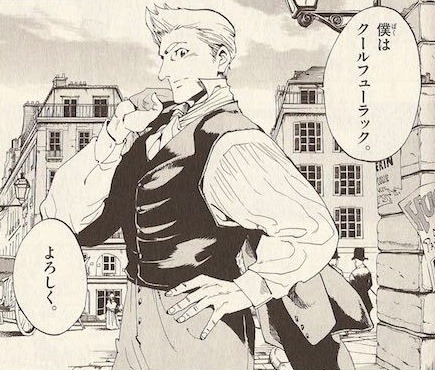
Feuilly:

Jean Prouvaire:

Combeferre:
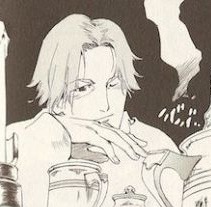
And Enjolras:

Arai does explain the pun, with ABC and Abaisse being spelled out phonetically in katakana next to the Roman alphabet characters in Enjolras' dialogue (a-be-se and a-be-sse, respectively). Les Amis are generally known as "ABCの友," (ABC-no-tomo) or "friends of ABC" in Japanese.
85 notes
·
View notes
Text

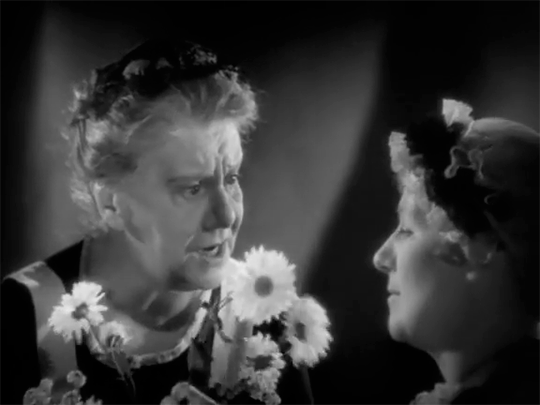

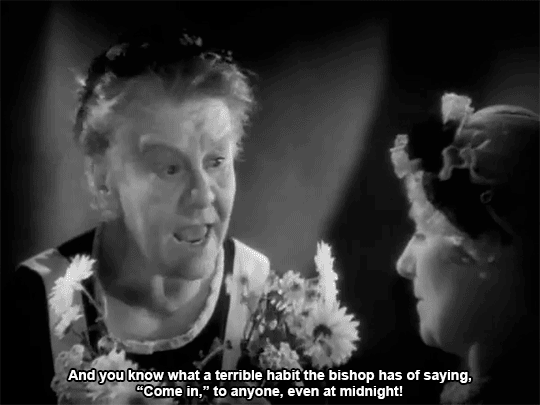

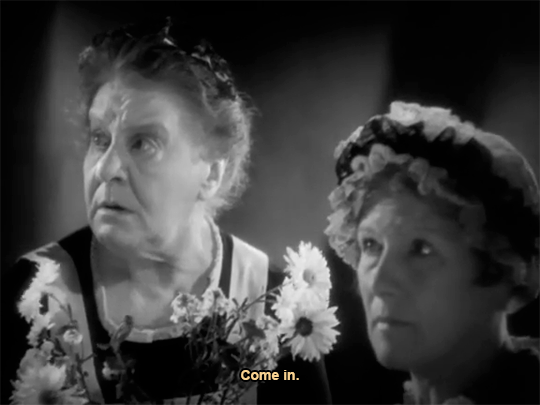
LES MIS LETTERS IN ADAPTATION - Prudence Counselled to Wisdom, LM 1.2.2 (Les Miserables 1935)
“We say that this house is not safe at all; that if Monseigneur will permit, I will go and tell Paulin Musebois, the locksmith, to come and replace the ancient locks on the doors; we have them, and it is only the work of a moment; for I say that nothing is more terrible than a door which can be opened from the outside with a latch by the first passer-by; and I say that we need bolts, Monseigneur, if only for this night; moreover, Monseigneur has the habit of always saying ‘come in’; and besides, even in the middle of the night, O mon Dieu! there is no need to ask permission.”
At that moment there came a tolerably violent knock on the door.
“Come in,” said the Bishop.
#Les Mis#Les Miserables#Les Mis Letters#Les Mis Letters in Adaptation#Les Mis 1935#Les Miserables 1925#Madame Magloire#Magloire#Baptistine#Baptistine Myriel#lesmisedit#lesmiserablesedit#pureanonedits#lesmiserables1935edit#lesmis1935edit#LM 1.2.2
77 notes
·
View notes
Text


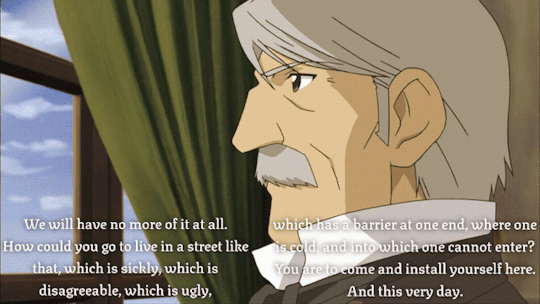
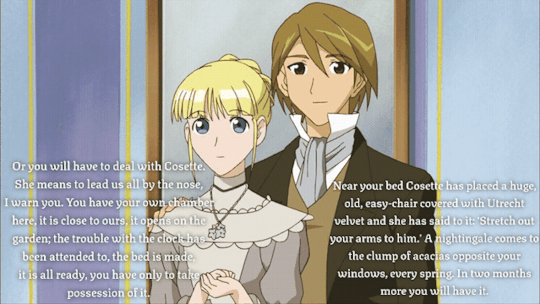

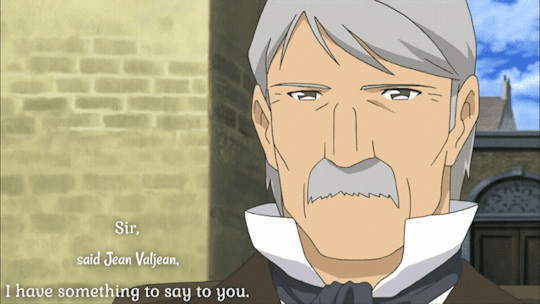
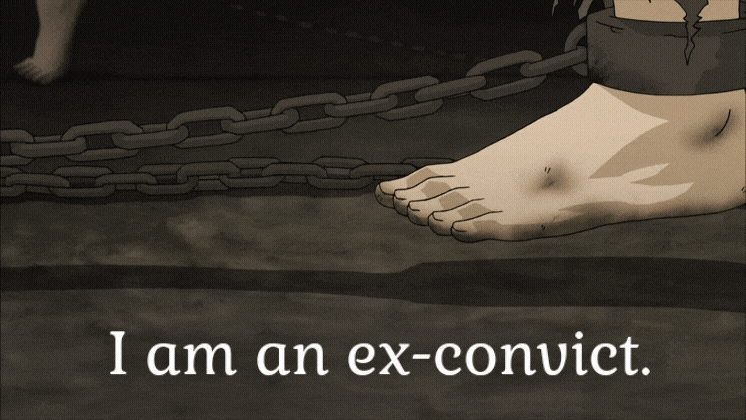

Marius' confession that he and Cosette would spend more times toghter, and Valjean's confession that he was an ex-convict. Volume 5, Book 7, Chapter 1.
Clips from <Il cuore di Cosette>.
#Les miserables#les mis#My Post#Jean Valjean#Marius#Cosette#Lark and Booby#Father and daughter#Owl and Wren#Jean le Cric#Javert#The Wolf and the Convict#Valjean's Confession#Please Valjean...#Why did you choose to drain your own life?#It's just like Javert did...#(Well in this adaptation they followed the plot of musical so not the worst thing happened.)#The Brick#Il cuore di Cosette#Les Mis Letters
20 notes
·
View notes
Text
Happy start of Les Mis Letters everyone!
Today we only get the preface, but I recommend taking note of what it's saying because it really is a sort of mission statement:
so long as ignorance and poverty exist on earth, books of the nature of Les Misérables cannot fail to be of use
Also... if you want to see someone completely fucking miss the point, look no further than the 1935 Hollywood adaptation's... ahem, "interpretation" of the preface:

"even after they have paid the penalty of the law and expiated their offenses in full"
Look, I'm not saying that the poor treatment of ex-convicts isn't addressed in the novel, but I'm just gonna point out that there's a reason why that bit isn't in Hugo's original preface and the bit about poverty and ignorance is.
#les mis letters#the funniest part is the two dashes#as if they were just abridging hugo's words#rather than entirely rewriting them
159 notes
·
View notes
Text
Tips for Les Mis Daily readers who want to avoid spoilers
Are you planning to read Les misérables in 2023? That's awesomet! As someone who has been in the Les Mis fandom for several years and had a blast in 2022 during Dracula Daily, I'm looking forward to joining Les Mis Letters and seeing how all the new people react to things old fans are already accustomed to.
But a word of warning: the Les Mis fandom is huge and active, so if you come to Tumblr for your daily memes, it will probably be a challenge to avoid spoilers.
That's why I've decided to share some advice based on my Tumblr experience in this fandom. This may not be enough to avoid all the potential spoilers if you're here very often, but I hope it will at least help you dodge a good amount of them.
This post is for you if:
You've never read Les misérables.
You haven't seen the musical or any other adaptation (or you have but it was so long ago that you hardly remember anything or you have but you aren't sure how accurate the adaptations are, so whatever happens in the book will come as a surprise).
You will be checking Tumblr while taking part in Les Mis Daily.
You don't like spoilers.
Mute the "les mis spoilers", "les miz spoilers" and "les miserables spoilers" tags. This one is obvious, but it won't be enough, so please keep reading.
Mute the "les mis", "les miz" and "les miserables" tags. Les Mis fans regularly use them to post pics, fanart, fanfics, metas and all kind of spoiler content and they don't tag them as spoilers because it's just regular posting for them.
Don't follow Les Mis blogs that aren't joining Les Mis Daily unless they commit to tag spoilers during this event.
Avoid musical blogs in general, since they usually share pics that may or may not contain book spoilers.
Don't scroll down or search the archive of old Les Mis or musical blogs. Some of them (such as mine) will be spoiler-free or tag the spoilers during this event, but if you scroll down enough you'll inevitably find content you'd rather not see yet.
Don't check any character's tags. Again, people who aren't joining Les Mis Daily will be posting about them and you'll come across spoilers more likely than not.
Try to stick to the "les mis daily", "les mis letters" or other event-specific tags. That's where people will be posting the day-to-day memes, metas and stuff anyway, so those tags will be your safest place to find people who are reading the book at your same pace.
Be especially careful from the 1st to the 7th June. The fandom goes wild during that week, especially on the 5th and 6th June. Mute the "barricade day", "barricade days" and "barricade week" tags. Don't worry, you'll only have to wait a few months to know why and then you can always check the tags later.
That's all I can think of for now, but I'll update this post if something else comes to mind (and if any Les Mis fan happen to read this, feel free to add your advice!).
And don't worry if you end up seeing spoilers! One day I'll tell you how I spoiled myself with an internet search I was too curious to delay... but the thing is, even though I was sad to find out something I would have preferred to read in the book at the right time, it didn't really take away from the effect when I actually reached that point. Les misérables is a huge book (fans call it "the brick") and even if you come across some major spoiler, there'll still have hundreds of pages you know nothing about.
Good luck and see you in the Les Mis Daily tag! 😄
127 notes
·
View notes
Text
fantine laughing along with them because she can't deal with what happened until later :''
#I relate#Les mis letters#Les mis#And even if she had cried they'd have mocked her for it so#Thinking about the italian adaptation where she keeps laughing and you can see she's destroyed
18 notes
·
View notes